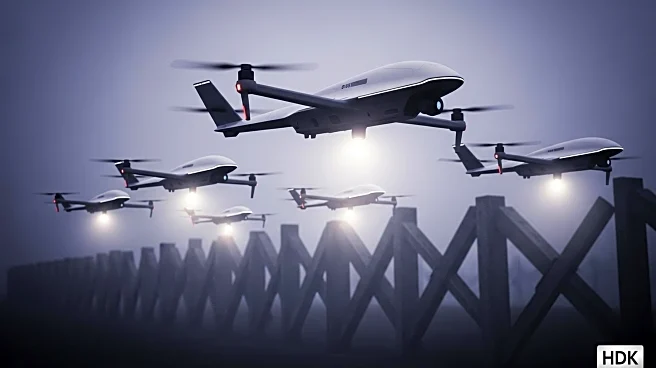What's Happening?
The European Commission's proposal to establish a 'drone wall' along the EU's eastern border has encountered resistance from member states during a meeting in Copenhagen. The initiative aims to create a network of anti-drone systems, including radars and acoustic sensors, to enhance collective security against aerial threats, particularly from Russia. While the plan has garnered support from some leaders, such as European Council President António Costa, others, including French President Emmanuel Macron, have expressed skepticism. Southern European countries, like Italy and Spain, argue that defense investments should benefit all EU members, not just those on the eastern flank. The proposal is part of a broader defense strategy called the Eastern Flank Watch, introduced by European Commission President Ursula von der Leyen. The next discussions are scheduled for October 15 in Brussels during a NATO defense ministers meeting.
Why It's Important?
The 'drone wall' proposal highlights the growing concern over security threats from Russia, particularly drone incursions into European airspace. The initiative underscores the need for coordinated defense strategies within the EU, as individual countries may struggle to address these threats alone. The proposal's divisiveness reflects broader geopolitical tensions and differing priorities among EU member states. If implemented, the 'drone wall' could significantly enhance Europe's ability to detect and counter aerial threats, potentially reducing the risk of security breaches. However, the opposition from key players like France and Germany suggests challenges in achieving consensus, which could delay or alter the project's scope and effectiveness.
What's Next?
The European Commission is preparing a second pitch for the 'drone wall' project, with further discussions set for October 15 in Brussels. The outcome of these talks will be crucial in determining the project's future, as EU leaders will review the defense roadmap and make key decisions. The initiative could be partially funded through the European Defense Industrial Programme, although details remain under negotiation. Ukraine's involvement, sharing expertise in drone countermeasures, may influence the project's development, as its experience is considered vital for building effective detection and interception systems.
Beyond the Headlines
The 'drone wall' proposal raises ethical and strategic questions about the balance between national sovereignty and collective security within the EU. The initiative could lead to long-term shifts in defense policy, emphasizing the need for integrated systems and shared resources. Additionally, the project may prompt discussions on the role of technology in modern warfare and the importance of innovation in defense strategies. The involvement of Ukraine, a non-EU member, highlights the interconnected nature of European security and the potential for collaboration beyond traditional alliances.










